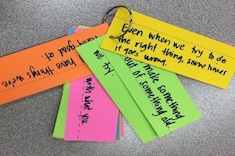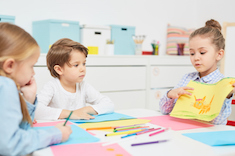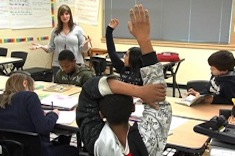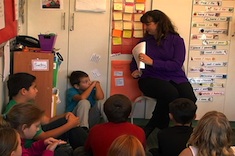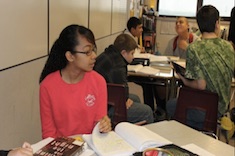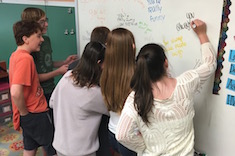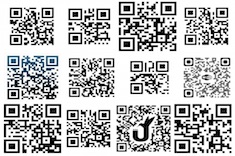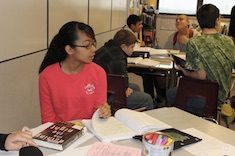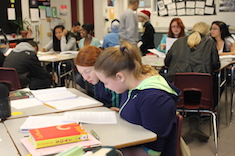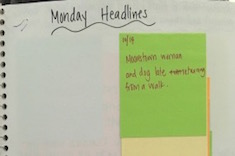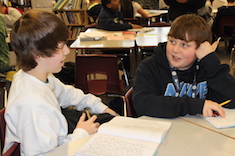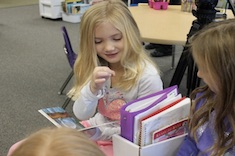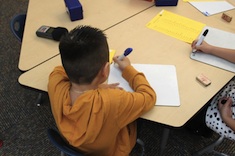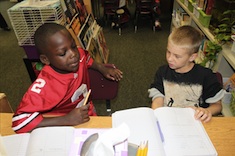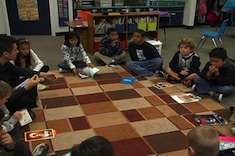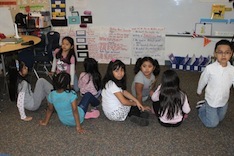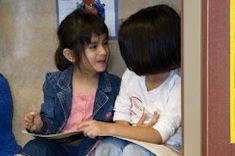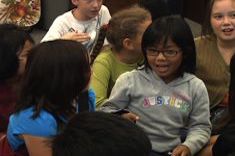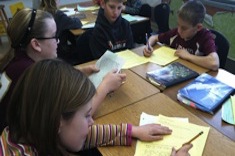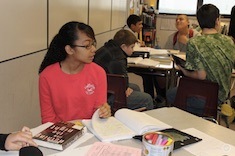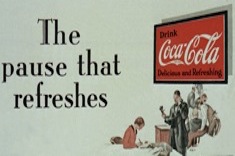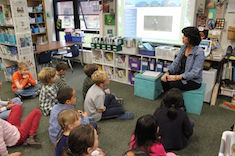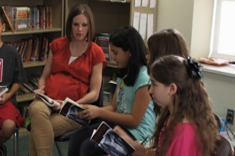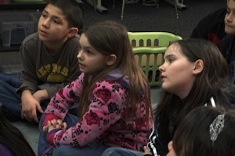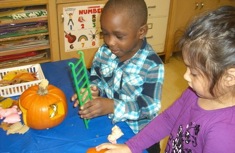Talking and Listening
Listening and speaking—it's the art at the heart of literacy workshops. But there is also a science to how these skills are taught and learned. These resources will show you how to build communication skills in your classroom and school communities.
Latest Content
Growing Talk About Reading
Tara Barnett and Kate Mills find that struggling readers in the early grades benefit from scaffolds and repeated practice in small groups. They share some of their favorite tools, including key ring prompts and anchor charts.
Stepping Away from the Conversation
Jennifer Schwanke explains why sometimes the best thing teachers can do to foster better conversations in their classrooms is to step away and let the talk unfold among students.
Balancing Whole-Class and Independent Reading in Middle School
The choice between whole-class novels or independent reading can be a false one in many middle school classrooms. Katie Doherty’s sixth graders discuss their reading together of a novel in verse, and Katie explains how some shared whole-class texts can support independent reading.
Talk Guide
Gigi McAllister presents a guide to her fourth-grade students to improve talk in reading trios.
Stop and Inquire
Mark Levine capitalizes on what captures his middle school students’ attention with his Stop and Inquire routine.
Better Writing Response Groups
Tara Barnett and Kate Mills discover giving “compliments and wishes” aren’t enough when it comes to useful feedback for revision in peer groups. They implement a more structured response process for writing groups.
QR Code Listening Stations
Listening stations are invaluable in elementary reading workshops, and can also be a hassle to set up and maintain. QR codes to the rescue! Stephanie Affinito shares how she helps teachers use simple online tools for setting up QR code listening stations.
Using Podcasts as an Alternative to Article of the Week
Gretchen Schroeder adapts the popular "Article of the Week" activity with podcasts as an alternative in her high school classroom, and shares some of her favorite podcasts to use with students.
Balancing Reading and Talk
Mark Levine finds that the best way to deal with controversial topics like slavery in his middle school classroom is with open and focused whole-class discussions.
Monday Headlines
Tara Barnett and Kate Mills use Monday Headlines to energize students after the weekend, and get a peek into what’s going on at home.
Small Solutions for Big Problems with Classroom Discussions
Gretchen Schroeder shares some conversation fixes for when talk goes awry in her high school classroom.
The Power of Picture Book Conversations
Katie DiCesare uses conversations around picture books to build communication, community, and reading skills in her first-grade classroom. Late in the school year she reflects with students about why these conversations are so powerful.
The Importance of Their Words
Melanie Meehan shares strategies and prompts for helping easily distracted young learners focus in conferences.
Learning Vocabulary in Context with English Language Learners
Stella Villalba explores why it is so important to teach vocabulary to English language learners in context.
Setting the Stage for Meaningful Peer Feedback
Tara Barnett and Kate Mills develop a scaffold with an index card to help student partners move from agreeable talk to suggestions for revising writing.
Pausing for Reflection in Second Grade
Sean Moore helps his second graders remember the classroom routines and protocols for sharing reading reflections through a circle group.
Mid-Workshop Conversations
Stella Villalba finds mid-workshop conversations are a terrific routine to add to literacy workshops to promote growth, especially for English language learners.
Potato the Crow: Blurring the Lines Between Reality, Fantasy, and Play with Young Learners
Leslie Woodhouse discovers a dollar store find takes on a life of its own in her preschool classroom in this delightful essay.
Words with Friends
Melissa Kolb explores what needs to be in place for our youngest students to learn how to converse kindly.
Whole-Class Conversations for Read Aloud Closure
Melanie Swider discovers that conversations after read alouds are a wonderful way for students to remember and retain the learning from shared texts.
How to Get a Book to Catch Fire
If your goal is to get teens more excited about independent reading, Gretchen Schroeder has suggestions to help.
Peer Evaluation of Student Writing
Megan Ginther found she was spending too much time responding to student writing, and just as important, taking on too much of the responsibility for improvement. She tackled the issue by developing a new program for peer evaluation of student writing.
Many Possibilities for Student Podcasting
Katherine Sokolowski shares how she has integrated podcasting into her 5th grade classroom.
Personal Listening Devices in Workshops
Justin Stygles finds that a ban on personal listening devices may not be the best option for students who are easily distracted. He explains how he designed a policy that allows students to listen to music of their choice during literacy workshops.
The Pause That Refreshes: Write When the Conversation Gets Hot
When’s the best time for some spontaneous opinion writing? Suzy Kaback argues it’s when class conversations get hot.
A Closer Look at Engagement
Are the terms stamina and engagement synonymous? Cathy Mere defines the terms by observing her first graders.
Tell Me More
Gretchen Taylor finds the three little words “tell me more” provide breakthroughs in helping her middle school students respond to reading.
Finding a Writing Buddy
Beth Lawson helps her fourth graders sort through what makes peer collaboration work during writing buddy time.
Pumpkin Time: Provocations and Stories with Preschoolers
Kelly Petrin reinvents a pumpkin decorating project with her preschoolers to help them build storytelling skills.
Your Opinion Matters—Really
Gretchen Schroeder guides us in getting feedback from students, as well as sharing with students the way their feedback matters to us. In a world where we are constantly asked to fill out feedback forms, it’s good to know when our opinions matter.
Browse Content By
Type
Category
- Assessment Tools
- Big Fresh Archives
- Booklists
- Choice Numeracy
- Classroom Design
- Common Core
- Community Building
- Conferring
- Content Literacy
- Digital Literacy
- English Language Learners
- Equity
- Family Relations
- Free Samples
- Guiding Groups
- Leadership
- Literacy Coaches
- Mentor Texts
- Minilessons
- New Teacher Mentors
- Podcasts
- Poetry
- Quote Collections
- Reading Strategies
- Self Care
- Struggling and Striving Learners
- Talking and Listening
- Teacher Study Groups
- Teaching Reading
- Teaching Writing
- Word Study and Vocabulary
Author
- Melissa Quimby
- Nawal Qarooni
- Gwen Blumberg
- Julie Cox
- The Lead Learners
- Hannah Tills
- Josie Stewart
- Ruth Metcalfe
- Mallory Messenger
- Becca Burk
- Jodie Bailey
- Vivian Chen
- Mary Brower
- Tiffany Abbott Fuller
- Stephanie Affinito
- Ruth Ayres
- Leigh Anne Eck
- Heather Fisher
- Shari Frost
- Julie Johnson
- Suzy Kaback
- Gigi McAllister
- Shirl McPhillips
- Melanie Meehan
- Cathy Mere
- Debbie Miller
- Tara Barnett and Kate Mills
- Tammy Mulligan
- Dana Murphy
- Bitsy Parks
- David Pittman
- Brenda Power
- Heather Rader
- Matt Renwick
- Mandy Robek
- Christy Rush-Levine
- Gretchen Schroeder
- Jen Schwanke
- Brian Sepe
- Katherine Sokolowski
- Stella Villalba
- Jennifer Vincent
Grade Level
Choice Literacy Membership
Articles
Get full access to all Choice Literacy article content
Videos
Get full access to all Choice Literacy video content
Courses
Access Choice Literacy course curriculum and training

